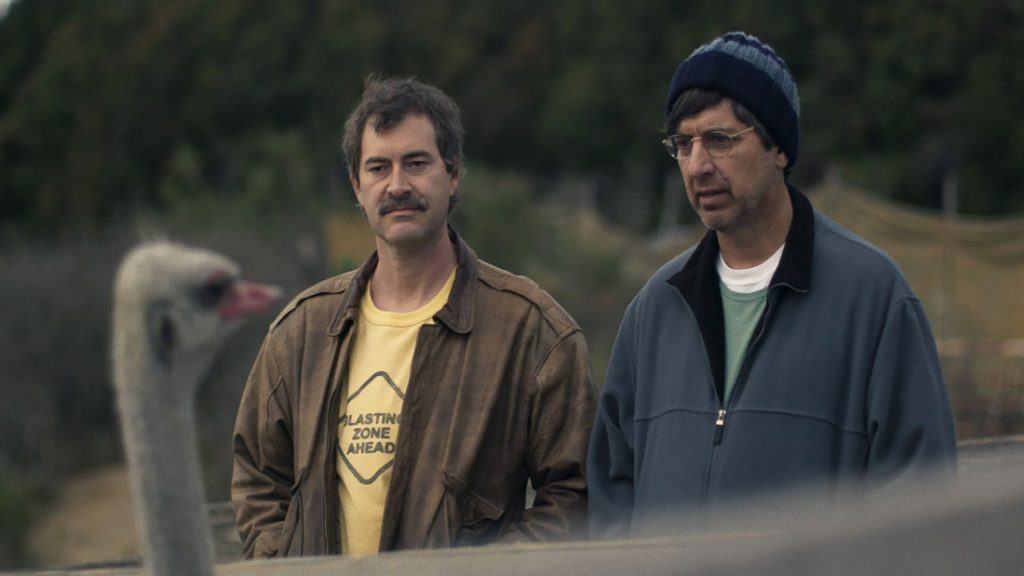Death Punch, by Bob Connally
1 Apr

Usually when discussing what makes a good film work the focus is on what the filmmaker does that makes it work so well. But sometimes, it’s just as much- if not more- what a filmmaker doesn’t do that can make a movie great. Due to its very basic setup, Paddleton is a movie that could go in a lot of directions tonally and much of what makes it so wonderful is how it doesn’t go in any of the directions we might have expected.
Director Alex Lehmann gets immediately to the point as Paddleton opens with its two central characters in a doctor’s office. Michael (Mark Duplass) is a middle-aged man who learns he has cancer while his concerned friend and neighbor Andy (Ray Romano) wants to know if what Michael has is incurable. Over the following days as Michael waits to hear his oncology test results, he and Andy spend all of their time outside of their jobs together. Their routine includes eating pizza, doing puzzles, watching kung-fu movies (their favorite is a ‘70s film entitled Death Punch, which sadly does not actually exist), and playing a racquetball-style game called paddleton, which they made up themselves. Every night Andy goes back upstairs to his own apartment where the routine will start again the following morning.
It becomes clear quickly that all these two neighbors have is each other, as Andy has terrible difficulty connecting with people. Small talk is his greatest nightmare. After a few days Michael gets the news they both feared and decides he wants no part of being in a hospital bed in his final days. Choosing to take his own life before the illness gets worse, Michael looks to Andy to help him. While decidedly against Michael’s decision to “give up,” Andy agrees to take a road trip with Michael to the nearest pharmacy willing to supply the pills Michael has been prescribed.
What sets Paddleton apart from a typical indie cancer dramedy is that it doesn’t go down either of the most obvious paths it could go down. It’s not the sort of film where the characters deliver soliloquies about life and death while the hottest indie folk rock band from two and a half years ago supplies the soundtrack. It is also not the sort of movie that feels the need to undercut every potentially emotional moment with forced dark humor. Lehmann isn’t trying to display to the audience how edgy his movie is. What he delivers instead is a film that forces absolutely nothing. The drama of the situation is inherent and the comedy comes purely from the two central characters and how they handle the situation. While other people pop in and out of the film here and there, Michael and Andy remain the focus of Paddleton and Lehmann directs with a light touch that allows the performances of Duplass and Romano to carry the movie. There’s really only one scene in the entire film where we really feel the presence of the camera and it comes at an appropriate moment and is used to outstanding effect.
The screenplay is credited to Lehmann and Duplass but by their own admission it was largely just an outline with virtually all of the dialogue improvised by Duplass and Romano. This is the sort of choice that could have led to a self-indulgent disaster but again, it’s what Paddleton doesn’t do that makes it special. Instead of Duplass and Romano attempting to one-up each other with comic quips, they stay true to the characters who are not trying to be funny. The humor and sadness come from the way their friendship feels so lived in and real. It’s in how Andy works on his great theoretical halftime speech he would give if he were a football coach or his incredible discomfort with talking to essentially anyone other than Michael. There’s also the sense that Michael is at peace with the fact that he is dying and that Andy cannot accept losing his only friend. A rare argument between the two in which Andy’s response to Michael being “the dying guy” is that he’s “the other guy” is totally believable. Andy is the one who will be left to deal with the void.
As the two friends and the film get closer to the inevitable, Lehmann and the two leads continue to display the same level of restraint present from the beginning. By never running towards a big emotional moment, Paddleton becomes remarkably moving by always being believable. It’s not often I watch a film and say, “I wouldn’t change a single thing,” but I can absolutely say that about Paddleton.
The film was released straight to Netflix in February of this year and has probably quietly and unassumingly showed up when you’ve logged in to watch the last few episodes of Arrested Development. So even its presence on Netflix is indicative of the kind of movie that it is. At 90 minutes, Paddleton is the right length for the story it’s telling and it’s absorbing and perfectly paced with seemingly little effort. I can’t recommend it highly enough. This is one of my favorite films of the past few years.



No comments yet